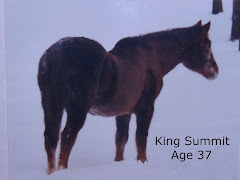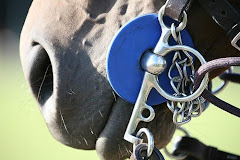
A few weeks ago I was visiting a friend at a boarding facility she owns. All of the horses were outside in paddocks, except for one. This lone horse was a beautiful 5 year old Thoroughbred stallion. The owner arrived, removed the horse from it's stall, groomed it using a horse vacumn cleaner, tacked up the horse and led it to the riding arena. Once mounted, the horse was immediately asked to collect itself and trot. This collected trot continued for about 15 minutes, and then the horse was returned to the barn to be groomed again, and put back into its stall. I should add that even though this was a stallion, at no time did he misbehave, or act "studdish". I commented to my friend about this, and she informed me that the horse is kept in its stall for 23 hours a day, and if its raining is not allowed outside at all. The owners riding time and routine is also always the same-hop on the horse with no warm-up, and trot for around 15 minutes. Even though this stallion showed no signs of distress over the routine, it got me thinking about horse psychology, and how they are able, or not able, to adjust to a humans' demands. This was a lovely stallion and only 5 years old. Will he eventually develop vices? Will he eventually become difficult to handle? Have any of my readers ever noticed how many products are available to control ulcers and cribbing? In one supply catalog I found 5 chemical products and 3 mechanical products. In another horse supply catalog I found 13 mechanical products, and 3 chemical products. This does not incude items and food additives for stress and boredom. This picture comes to my mind-horse in stall with bars across the front,except for a spot to add grain. It's wearing a cribbing strap or muzzle, and hobbles on its hind legs, "jolly ball", "Pas-a fier", "Jolly Stall Snack", Himalayan salt-on-a-rope,and some other stall "toy". At feeding time, there are more additives in the food than there is grain! What are we doing to our horses? Wouldn't it be a lot easier, and better for the horse to let it be a horse, and not some object it wasn't designed to be? Please don't comment to this blog article by telling me that "a horse is personal property, and as such we can do whatever we damn well please."






Great post. It is amazing, what horses can and will adapt to. It is bizarre, all of the medications we have to make the horse "happy". It's so sad, really. Wonder how the stallion is bred. His temperament, if that's really him in his natural state, is gold, and whomever trained him, also, gold.
ReplyDelete